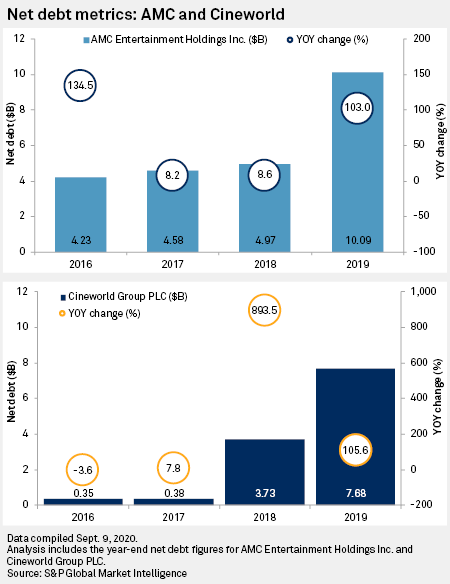Having secured their short-term survival, AMC Entertainment Holdings Inc. and Cineworld Group PLC could sell or list select European movie theater operations to boost cash reserves amid long-term disruption to ticket sales from the coronavirus pandemic, according to analysts.
The majority of theaters in Europe have reopened following local lockdowns, though caps on capacity range from 15% to 50%. Factors impacting attendance also include delays to film releases and customer wariness as COVID-19 cases rise again in several European markets.
"I don't think we can fully get back to the old normal until 2022," said Eric Handler, a senior media and entertainment research analyst at MKM Partners. With a complete recovery in attendance dependent on the widespread availability of a coronavirus vaccine, 2021 customer numbers are expected to be 20% below 2019's, said Chad Beynon, head of consumer at Macquarie Research.
Should these predictions play out, Europe's major chains could be forced to boost liquidity by monetizing their assets, including via divestments, analysts said.
Cineworld secured a $250 million debt facility during the U.K. lockdown. While this "temporarily" improves liquidity, an uncertain future could place pressure on its credit rating, said Alexandra Balod, a senior analyst in the corporate ratings team at S&P Global Ratings, a division of S&P Global.
The rating division of S&P Global affirmed Cineworld as CCC+ in June and stabilized its outlook.
"That's a low rating, the definition is that its capital structure is unsustainable and that we're concerned how it will survive once normal operations resume and there is some risk of default being elevated and that's why we did not upgrade it," Balod said.
"Selloffs could be a possibility but comes down to how much freehold they have and assets they have," Balod said.

Meanwhile AMC, the world's largest movie theater operator and owner of Europe's Odeon Cinemas Group Ltd. and UCI chains, recently disposed of nine theaters in the Baltics for $77 million to UP Invest, the owner of a regional cinema group.
Its Nordic operations, composed of 68 theaters with 463 screens, is its most attractive due to a smaller capex level that could help it gain a larger divestment multiple, Beynon said.
AMC could also divest its smaller operations in countries such as Spain and Italy, Handler said. "[AMC] has a very strong market share in the U.K. That is really the linchpin of Europe for them," he said. "They could look at some other markets in Europe where they are not the number one or two player and potentially sell those assets as well."
The company could also turn to equity markets to boost liquidity, Beynon said. AMC in 2018 began work on a $2 billion initial public offering of the U.K.'s Odeon cinemas. Earlier this year, it said the listing was currently "off the table" as there were "other ways to prove" that its European theaters were being undervalued at 7x EBITDA.
AMC's rival Cineworld has fewer options in comparison, analysts said. After striking two sale and leaseback deals for a total of 35 U.S cinemas worth more than $556 million last year, CEO Moshe Greidinger said in December that it had exhausted those opportunities since all its cinemas were now rented.
"It will certainly be comforting to see the company enhance its liquidity position further in the coming months as attendance levels to cinemas will likely be low," said Gunjan Dixit, a vice president and lead analyst for Cineworld at Moody's. In order to achieve that, Cineworld may consider accessing the debt market again or injecting equity, she added.
Beyond sales and flotations, the two operators are expected to offset additional operating expenses brought on by the virus with cost-cutting measures implemented during shutdowns, analysts said. Both companies have suspended dividend payments and cut staff. Cineworld executives agreed to defer payments of their full salaries and bonuses.
AMC is facing $5 million per month in costs associated with the pandemic, including sanitary, supplies and labor payments, Beynon estimated. The exhibitor said in late August that its use of new equipment including electrostatic sprayers, HEPA vacuums and upgraded air filtration filters had caused its cleaning costs to quadruple.



